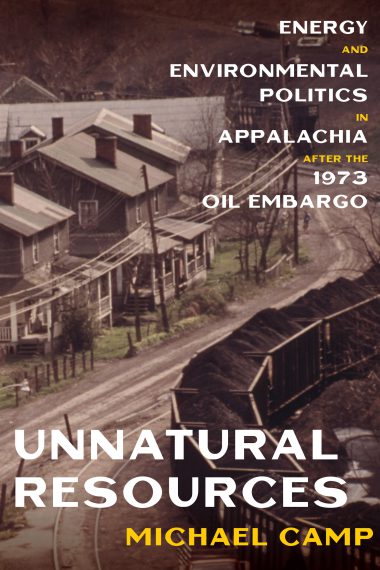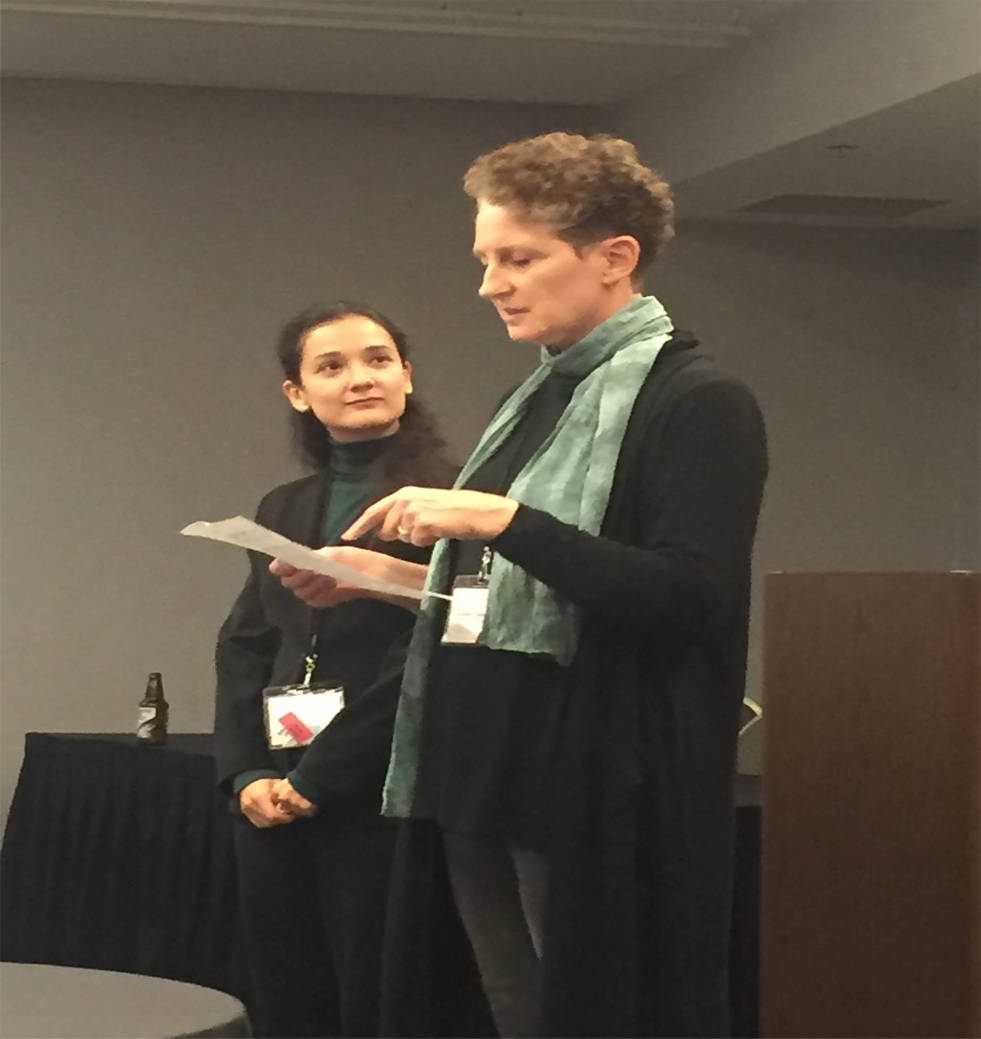Former History major and 2017 alumna Samantha Perlman was recently elected to the city council of Marlborough, MA. Perlman is the youngest woman elected to Marlborough’s city council, and in the election earlier this month she received more votes than any other candidate. Perlman completed a double major in History and African-American Studies at Emory. Read more about the recent election: “After Dogged Campaign, Perlman Is Marlborough’s Biggest Winner.”
Category / Alumni
Michael Camp (PhD, 2017) Publishes ‘Unnatural Resources: Energy and Environmental Politics in Appalachia After the 1973 Oil Embargo’

Dr. Michael Camp, a 2017 alumnus of the history graduate program, recently published his first book, Unnatural Resources: Energy and Environmental Politics in Appalachia After the 1973 Oil Embargo, with University of Pittsburgh Press. Camp is Assistant Professor and Political Papers Archivist at the University of West Georgia. He completed his doctoral thesis, “Greater Abundance: Energy Production, Environmental Protection, and the Politics of Deregulation in the United States after the OAPEC Embargo,” under the supervision of Jimmy Carter Professor of History and Department Chair Joseph Crespino. Read the publisher’s summary of Unnatural Resources below and find more information on the University of Pittsburgh Press website.
“Unnatural Resources explores the intersection of energy production and environmental regulation in Appalachia after the oil embargo of 1973. The years from 1969 to 1973 saw the passage of a number of laws meant to protect the environment from human destruction, and they initially enjoyed broad public popularity. However, the oil embargo, which caused lines and fistfights at gasoline stations, refocused Americans’ attention on economic issues and alerted Americans to the dangers of relying on imported oil. As a drive to increase domestic production of energy gained momentum, it soon appeared that new environmental regulations were inhibiting this initiative. A backlash against environmental regulations helped inaugurate a bipartisan era of market-based thinking in American politics and discredited the idea that the federal government had a constructive role to play in addressing energy issues. This study connects political, labor, and environmental history to contribute to a growing body of literature on the decline of the New Deal and the rise of pro-market thinking in American politics.”
Julie Livingston (PhD, 2001) Publishes ‘Self-Devouring Growth: A Planetary Parable as Told from Southern Africa’

Dr. Julie Livingston, Julius Silver Professor at New York University, recently published Self-Devouring Growth: A Planetary Parable as Told from Southern Africa with Duke University Press. Livingston was the first student to receive the PhD in African History from Emory in 2001. In 2013, she received a MacArthur Fellowship from the John D. and Catherine T. MacArthur Foundation. Her work sits at the intersection of history, anthropology, and public health. Read Duke UP’s summary of Self-Devouring Growth below and see her other work on Livingston’s NYU faculty profile page.
“Under capitalism, economic growth is seen as the key to collective well-being. In Self-Devouring Growth Julie Livingston upends this notion, showing that while consumption-driven growth may seem to benefit a particular locale, it produces a number of unacknowledged, negative consequences that ripple throughout the wider world. Structuring the book as a parable in which the example of Botswana has lessons for the rest of the globe, Livingston shows how fundamental needs for water, food, and transportation become harnessed to what she calls self-devouring growth: an unchecked and unsustainable global pursuit of economic growth that threatens catastrophic environmental destruction. As Livingston notes, improved technology alone cannot stave off such destruction; what is required is a greater accounting of the web of relationships between humans, nonhuman beings, plants, and minerals that growth entails. Livingston contends that by failing to understand these relationships and the consequences of self-devouring growth, we may be unknowingly consuming our future.”
‘Masquerading Politics,’ by John Thabiti Willis (PhD, 2008), Named African Studies Association Book Prize Finalist

John Thabiti Willis (PhD, 2008) published Masquerading Politics: Kinship, Gender, and Ethnicity in a Yoruba Town with Indiana University Press in 2017. Willis’ book is a finalist for the African Studies Association Book Prize, the premier award given by the association. The book stems from Willis’ 2008 dissertation, “Masquerading Politics: Power and Transformation in a West African Kingdom.” Professor Emeritus of History Kristin Mann was Willis’s advisor.
Willis is Associate Professor of History and Director of Africana Studies at Carleton College. Read the summary of Masquerading Politics from Indiana UP below.
“In West Africa, especially among Yoruba people, masquerades have the power to kill enemies, appoint kings, and grant fertility. John Thabiti Willis takes a close look at masquerade traditions in the Yoruba town of Otta, exploring transformations in performers, performances, and the institutional structures in which masquerade was used to reveal ongoing changes in notions of gender, kinship, and ethnic identity. As Willis focuses on performers and spectators, he reveals a history of masquerade that is rich and complex. His research offers a more nuanced understanding of performance practices in Africa and their role in forging alliances, consolidating state power, incorporating immigrants, executing criminals, and projecting individual and group power on both sides of the Afro-Atlantic world.”
Marni Davis (PhD, ’06) Publishes Piece in ‘The History Teacher’
Marni Davis (PhD ’06) co-authored an article in The History Teacher on how to teach students about the importance of the footnote. In the piece, which is co-authored with Jill E. Anderson, they write: “Footnotes offer a crucial window into historians’ methods of building an argument and using evidence.” Davis is a historian of ethnicity and immigration in the United States and Associate Professor at Georgia State University. Read the full article, “Follow the Footnote.”
Alumni Update: Marissa Zampino (’19C)
Former History major Marissa Zampino graduated from Emory College in 2019. Below she offers an update on professional life following graduation, including a return to Atlanta through the AmeriCorps VISTA program. Read Zampino’s update below, and if you are an alumnus with news to share, please write to us at history [at] emory [dot] edu.
“I am back in Atlanta and working at Morehouse College through an AmeriCorps VISTA program. My service site is a division of the Morehouse Bonner Office of Community Service called the Morehouse College Community Revitalization Initiative (MCCRI). We primarily run educational programs every week at elementary schools in the West End and Westview, but we are also working on a genealogy project. I also attend monthly community meetings for the Atlanta University Center Neighborhood Association to see how Morehouse can get more involved in the community. I am planning on going to graduate school Fall 2021, but I am debating between a few programs/concentrations to apply to. I really would like to pursue a PhD in Ethnic Studies or American Studies, but through my AmeriCorps experience I am discovering that I truly enjoy community activism and educational/public policy.”
– Marissa Zampino
Claudia Kreklau (PhD, ’18) Wins Article Prize from Goethe Society of North America

Congratulations to Claudia Kreklau (PhD ’18), who won the Richard Sussman Prize in the History of Science 2019 for her article “Travel, Technology, Theory: The Aesthetics of Ichthyology during the Second Scientific Revolution” (German Studies Review, 2018). The prize is awarded by the Goethe Society of North America and was announced at the German Studies Association 43rd Annual Meeting in Portland, Oregon.
Debjani Bhattacharyya (PhD, ’14) Wins Honorable Mention for Best Book from the Urban History Association
Congratulations to Dr. Debjani Bhattacharyya, Assistant Professor of History at Drexel University and a 2014 PhD, whose first book recently won an award from the Urban History Association. Bhattacharyya published Empire and Ecology in the Bengal Delta: The Making of Calcutta with Cambridge in May of 2018. The Urban History Association awarded the book honorable mention for 2017-18 Best Book in Non-North American History. Bhattacharyya is currently a Visiting Research Scholar at Princeton University in the Department of History and the Shelby Cullom Davis Center for Historical Studies.
Alumni Update: Alexander Gouzoules (C’08) Publishes “The Diverging Right(s) to Bear Arms”
Alexander Gouzoules graduated from Emory College in 2008 and subsequently attended Harvard Law School. He recently published an article, “The Diverging Right(s) to Bear Arms: Private Armament and the Second and Fourteenth Amendments in Historical Context,” in the University of Alabama Civil Rights and Civil Liberties Law Review (Vol. 10, 2019). The blog Second Thoughts from Duke University recently featured Gouzoules’ piece in their Scholarship Spotlight series. Read part of their summary below, along with the full article here. Gouzoules is an attorney in New York City.
“The main thrust of the article is to emphasize and explore the nature and scale of change in how private armament was understood between 1791, when the Second Amendment was ratified, and 1868, when the Fourteenth Amendment (which makes the Second Amendment applicable to the states) was ratified. To over-simplify a bit: While private arms-bearing to deter the tyranny of the standing federal army might have made sense in the 1790s, the situation was entirely different by the late 1860s. In showing as much, Gouzoules deepens (and credits) an argument that Akhil Amar made more than a decade before Heller. Gouzoules’ target is not simply the Second Amendment, however, but originalism itself: ‘These radically different understandings can only be reconciled by defining the right to bear arms at such a high level of generality as to overlook the actual intentions of both amendments’ framers, thus undermining the project of originalism to which these contemporary decisions were ostensibly committed.’
Dr. Lisa Greenwald (PhD, ’96) Discusses ‘Daughters of 1968’ on New Books Network Podcast
Dr. Lisa Greenwald, an alumna of the History graduate program, was recently interviewed on the podcast of the New Books Network. Earlier this year Greenwald published Daughters of 1968: Redefining French Feminism and the Women’s Liberation Movement with the University of Nebraska Press. She was interviewed by Beth Mauldin, an Associate Professor of French at Georgia Gwinnett College in Lawrenceville, Georgia. Greenwald teaches history at Stuyvesant High School in New York City. Go to the New Books Network website to listen to the podcast.
